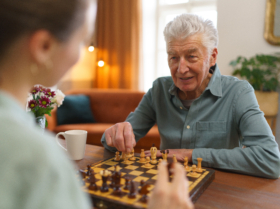Hallucinations and Delusions
What are Hallucinations?
- Hallucinations are a sensory experience of something that is not there.
- Hallucinations are caused by the changes to the brain that are part of the dementia process.
- Hallucinations are more common in Dementia with Lewy Bodies, Parkinsons related dementia, and the later stages of Alzheimers Disease. They are also, often present during a delirium episode, and more rarely, they can be associated with a reaction to medication.
- Any of the senses can be involved although visual hallucinations are the most common.
– Visual hallucinations are seeing things that are not there.
– Auditory hallucinations are hearing things that are not there.
– Olfactory hallucinations are smelling things that are not there.
– Tactile hallucinations are physically feeling things that are not there.
– Gustatory hallucinations are tasting things that are not there. - Sometimes a person with dementia can experience hallucinations that are very real to them. They can range from being pleasant to being extremely distressing and quite long in duration.
- Hallucinations are NOT part of the person’s imagination or “pretend”
Information Sheet
Responding to hallucinations – hearing, seeing, smelling, and feeling things that are not there.
- Check the environment and make changes as necessary. e.g. if the lighting causes shadows that trigger a hallucination, change the lighting.
- Maintain routines so that there are not too many surprises.
- Be Truthful.
- Don’t deny their experience – it is very real to them.
- If the hallucination is happy, it’s OK to ignore it.
- If the hallucination is distressing the person may be agitated so exercise caution. Write down what happened so that you can discuss this with the doctor. It is helpful to be able to tell the doctor if there are any triggers, what the person is seeing and how they respond to that, also duration and frequency.
- Validate any feelings they may have about what they are experiencing.
- Offer reassurance.
- Divert to something else.
When to seek medical help
- If the hallucinations involve more than one of the senses.
- If the hallucinations frighten the person.
- If the hallucination lasts a long time.
- If the person with dementia also appears to be more confused than normal – this could be a sign of delirium.
What is delusional thinking?
- A delusion is a staunchly held belief that is false. The person having the delusion is unable to understand that it is false, and it is extremely had to shift the thought/ belief from their mind. Often delusions occur when a person jumps to conclusions without concrete evidence.
- Delusions can be very confusing and frightening, especially if they are paranoid or persecutory in nature and the person experiencing the delusions believes others are doing things against their will or to harm them.
What you might see if a person has delusional thinking.
- Belief that someone is stealing from them or trying to harm them.
- False accusations of unfaithfulness.
- Hiding possessions to “keep them safe”.
- Regular phone calls t the police.
- Barricading themselves inside or not answering the door or telephone.
- Doing activities from a bygone era as they believe they are in earlier time
- Reliving past events / traumas
- Paranoid thoughts e.g. “shhh… they can hear us!”
Responding to delusional thinking
- Strongly held false beliefs that the person with dementia thinks are real. Paranoia is a type of delusion where the person feels that others are out to harm them in some way.
- It’s not easy – but try not to take offence if you are accused of something that is false.
- It’s not helpful to argue or try and convince the person.
- Listen to what is troubling them. Let them know that you care.
- Check things out whether the beliefs are true or false- don’t just assume.
- Look for the reason behind the delusion. E.g. Accusations that someone has stolen something are likely because they have lost it. Check that things haven’t been misplaced. On that front, – have regular places for things that get easily lost such as wallets & keys.
- Consider that the person with dementia may have confused the past with the present. It may have occurred in the past.
- Keep to a regular routine as much as possible.
- Offer reassurance.
- Validate any feelings that are expressed due to the false thinking. E.g. it’s awful when you know something is missing- let’s just go and check once more in case it’s been misplaced.
- Divert to another activity – move to a different room, go into the garden, or go for a walk.
- Turn off the TV if the programme is violent or upsetting.
- Explain to others that the delusional thinking is occurring because of their dementia.

